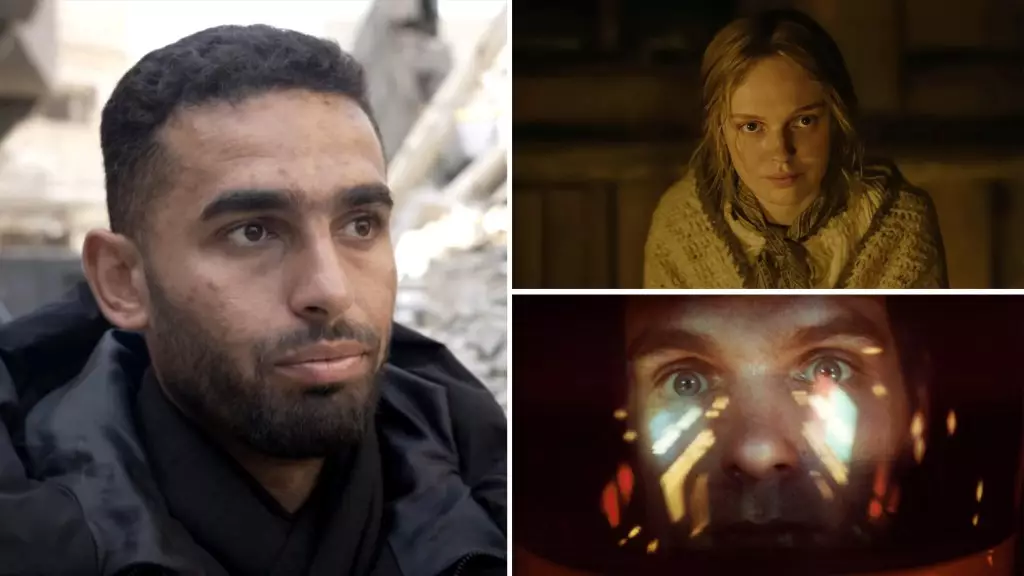As the award season approaches, a notable contender is making waves—*From Ground Zero*, Palestine’s entry for the Best International Feature Oscar. Set to debut this weekend in approximately 70 AMC theaters across the top 20 markets and select art houses like Quad in New York and Laemmle Royal in Los Angeles, this documentary offers a deeply personal lens into life in Gaza. Developed by Watermelon Pictures and curated by Gaza native Rashid Masharawi through a compilation of 22 video diaries, the film transcends political discourse to provide a poignant portrayal of resilience amid devastation.
The documentary provides personal insights into the daily struggles of countless families attempting to survive in the face of relentless Israeli bombardments. Rather than delving into the intricacies of the ongoing conflict, it captures fleeting moments of human connection and normalcy that emerge even in the starkest of conditions. Masharawi, now residing in France, initiated a fund to support filmmakers in Gaza amidst the turmoil of the Israel-Hamas war, taking bold steps to ensure that their stories reach broader audiences.
Opening during a period when the Oscar nominations were freshly announced, the film’s timing exemplifies both risk and opportunity in a crowded market. Justin DiPietro, the executive vice president at MPI Media who oversees the film’s launch, is aware of the challenges ahead but optimistic about the film’s reception. With screenings scheduled in cities with significant Palestinian communities—such as Chicago and Detroit—there’s an underlying hope that the film will resonate powerfully with various audiences. The film has begun to gain critical acclaim, currently holding a 93% rating on Rotten Tomatoes, reflecting a potential shift in how international narratives are shared in American cinemas.
In stark contrast to *From Ground Zero*, the horror-thriller *The Damned* is premiering almost simultaneously, scheduled for over 700 screens across the United States. Directed by Thordur Palsson, whose background includes work on *The Valhalla Murders*, this film transports viewers to an isolated Icelandic fishing community in the 19th century. The narrative follows Eve, portrayed by Odessa Young, who is burdened with the weighty decision of saving a shipwrecked crew or prioritizing her community’s survival.
As both films confront survival under extreme circumstances, *The Damned* weaves a tale filled with suspense, moral dilemmas, and psychological horror. The film’s exploration of guilt and the psychological toll of desperate choices resonates deeply, perhaps engaging those viewers intrigued by the human psyche in crisis. Released by Vertical, *The Damned* garners an 84% rating from critics on Rotten Tomatoes, signifying its success in engaging audiences and critics alike.
Although both films depict harsh realities, they cater to vastly different genres—documentary versus horror—highlighting the diverse storytelling landscape currently unfolding in theaters. With their unique approaches, both films reflect societal perspectives shaped by trauma, whether that trauma be geopolitical or personal.
While films like *From Ground Zero* and *The Damned* address primal human instincts in extreme situations, the Film Forum in New York has launched a retrospective showcasing the intersection of technology and humanity in cinema. Titled “From Metropolis to Ex Machina: How Movies Have Been Warning Us About AI for Nearly 100 Years,” this three-week event immerses audiences in cinematic history, highlighting stories that predate the term “artificial intelligence.”
Curated by Bruce Goldstein, the retrospective includes iconic films such as Fritz Lang’s *Metropolis*, which introduced audiences to the concept of a robot and raised ethical questions about technology’s role in society. These narratives reveal a longstanding apprehension towards AI, often portraying it as a formidable force capable of surpassing human control. The festival encourages audiences to reflect on the portrayal of technological evolving from labor-saving tools to entities with potentially dark intentions, a transition that echoes contemporary anxieties surrounding AI development today.
Goldstein’s insights into the festival ponder that while AI’s portrayal has varied across film history, a mere handful of films depict AI in a positive light. As cinema has evolved, so too has the public perception of technology, often resulting in a complex relationship rife with fear, distrust, and occasional wonder. This retrospective, which features 30 films ranging from *2001: A Space Odyssey* to life-like robots in children’s movies, serves as a reminder of how far cinematic storytelling has come—and how far society must still navigate the challenges presented by emerging technologies.
In today’s cinematic landscape, films like *From Ground Zero* and *The Damned* serve as vibrant narratives that explore survival through unique lenses, while film retrospectives like Goldstein’s initiative underscore the fundamental questions surrounding our future with technology. As the lines blur between reality and fiction, the ways in which filmmakers convey stories about human resilience, moral dilemmas, and the implications of technology mirror the complexities of modern life. With awards season on the horizon, these films and retrospectives promise to invite critical conversations around what it means to be human in an increasingly complicated world.

